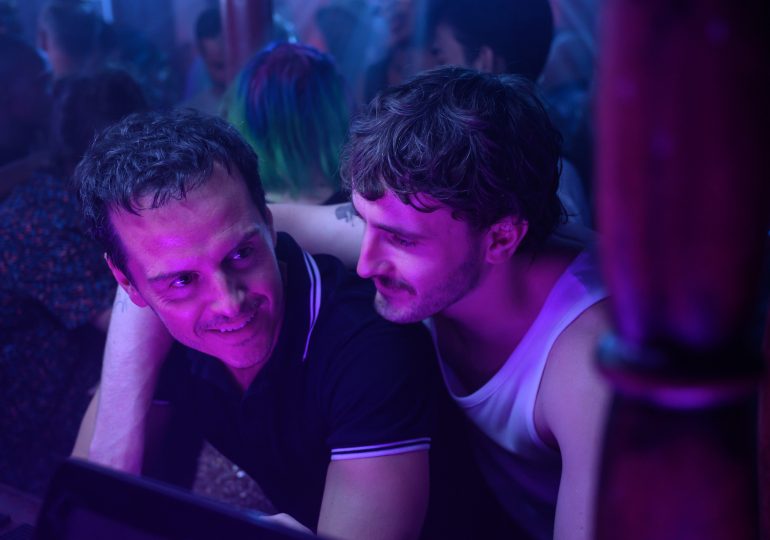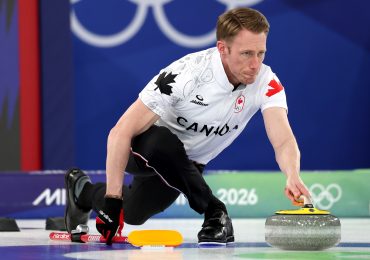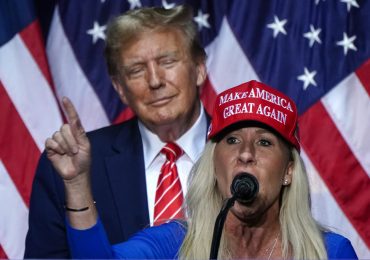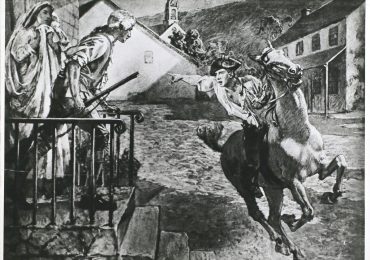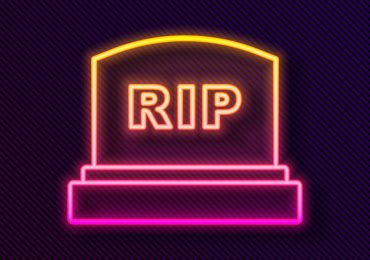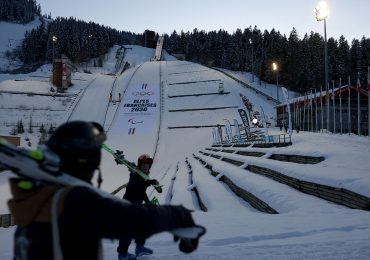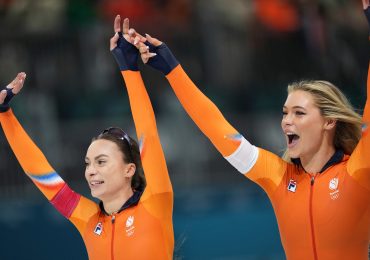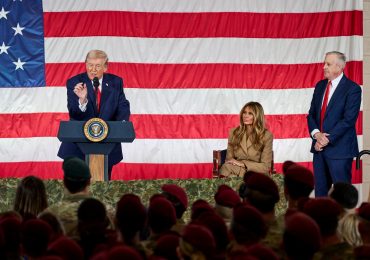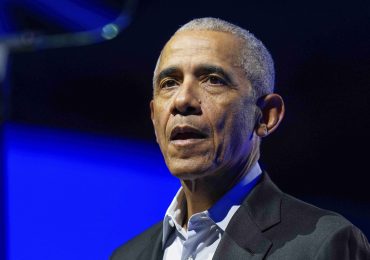Warning: This post contains spoilers for the movie All of Us Strangers.
All of Us Strangers is a ghost story, a meditation on the creative process, and a minor-key romance all rolled into one staggering package. Its many layers defy easy explanation. “For me, it’s just about the difficulty of being in the world and the complications of having relationships and carrying all those things that you pick up along the way in your life,” writer and director Andrew Haigh says.
[time-brightcove not-tgx=”true”]
The film, which comes to theaters Dec. 22 after a successful run on the fall festival circuit, is an adaptation of Taichi Yamada’s 1987 novel Strangers. The book follows a solitary middle-aged screenwriter who reencounters his long-dead parents and begins paying them regular visits while developing a relationship with a woman in his apartment building. Haigh, best known for HBO’s Looking and the swoony gay drama Weekend, made both protagonists men. Fleabag breakout Andrew Scott plays Adam, the writer drawn to his past as he attempts to start a new script. His suitor is Harry (Paul Mescal), an alluring neighbor who surfaces right as Adam discovers a sort of portal that allows him to commune with his parents (played by Claire Foy and Jamie Bell).
Depending on your interpretation, All of Us Strangers can be both heartbreaking and hopeful. In order to move forward, Adam must shed the anguish of what he hasn’t been able to share with his kin—all that was left unsaid when they died in a tragic accident 30 years earlier. Haigh, 50, shot part of the movie in his own childhood home near London. He talked to TIME about how it came together and why he resisted an unequivocally happy ending.
Read more: The 10 Best Movies of 2023
TIME: Was there something that felt especially vulnerable once you made the decision to shoot in your childhood home? Or was that just kismet?
Haigh: It was crazy, but I do think it was sort of kismet. I knew I wanted to try and put myself into this story in a way that I felt would unlock something more universal. If you allow yourself to be vulnerable, you hope that that vulnerability comes across onscreen and speaks to other people’s vulnerability. If I’m trying to transmit a feeling, then I need to be open about allowing myself to be up there on the screen.
When you started pursuing the project, was it immediately clear that the only way for you to make this was to change the leads to two men?
Absolutely. I wouldn’t have done it otherwise. It was definitely wanting to explore and express how I feel about a certain generation of gay men, basically my generation. I’ve wanted to do that for a while, but I could never quite find the right story to do it. And then telling it in the form of this strange ghost story about, essentially, what haunts us felt like the perfect way to explore a certain generation of people and what happened to us in the ’80s and ’90s. Connecting that with a story about grief and about a need to reconnect with parents felt like this perfect osmosis.
Andrew Scott was cast first. Once you had Andrew on board, what was the essence of what you were looking for in Harry?
I always go about casting not even thinking about anybody else until I know who that central protagonist is. My films have a single protagonist, even though the other roles are very fundamentally important. I had to get that role of Adam right. I knew that with Andrew, he had that vulnerability. We talked a lot about this idea of someone keeping all of this pain inside and then it finding ways to just leak to the surface. I think he’s so brilliant at showing those moments when his fear or his pain or anxiety—or his love or his joy—break to the surface. With Harry, it is about finding someone that can open Adam up. He’s ready to listen to Adam, which is the same thing Adam is trying to get from his parents. And then at the same time, he has his own secret story that needs to be softened by Adam by the end. When I met Paul, he just understood all of that. I think they’re great together. They feel like they’re meant to be with each other.
Was Harry’s scraggly look your idea, or did something about Paul conjure that?
I mean, I love a bit of facial hair. It also just made sense for this character. He hasn’t looked after himself, or he’s decided not to bother. It doesn’t take much to go out on the queer scene and see people that have a certain look. But you make all these choices. For example, there was a choice for him and the Jamie Bell character to both have mustaches. People always say they’re never surprised that a straight man goes for someone that’s like their mom, and it’s the same with gay people. We probably go for elements of our dad. When you’re talking about a story that’s about this interaction between parental love and romantic love, it also feeds into that idea.
In the scene where Adam submits to Harry’s advances, they’re on the couch. The camera pans up and down and emphasizes the way they are caressing each other’s thighs. What kind of direction did you give the two of them for that?
Sex scenes are so difficult to shoot. What you have to do is make sure that each actor knows what the intention of that scene is. What does Harry need to do to make Adam feel comfortable? Because it’s clear that Adam is holding something back. So what can he do to soften that in order for them to connect? It’s very written-out in the script, like when Adam laughs that he’s forgotten how to breathe because he hasn’t kissed for a while. You’re getting to know him there. You understand his reticence and his nervousness. It’s not that he’s a prude. He just hasn’t made out with a guy for a while. I knew I wanted it to feel very sensual in terms of touch and feel and sound. We highlighted the sound of skin touching skin so you can feel this sort of tender electricity. It has to feel sexy and intimate and a bit dirty in a good way.
Read more: The 10 Best Movie Performances of 2023
There’s a misdirect when Adam first stumbles upon his father in the thicket. Because we don’t yet know who he is, it feels like they’re cruising each other in that moment, which also has appropriate generational implications. How did the dots come together for that scene?
In a messy way, in my head, I knew that I wanted it to feel almost erotic or spine-tingling or strange somehow. There is a sense that he’s drifting off into the past. When your sexuality plays such a big part in your self and your past, it just made sense to bring that into that scene. I tried not to listen too much to the arguments in my head about how it should feel, so when the dad appears, looking like he does at roughly the same age Andrew is now, you can’t help but feel a certain tingle of sexuality to it. You know later on that his parents don’t actually know that he’s gay, so it’s also foreshadowing that thing that’s going to have to be revealed later on down the line.
The sequences where he returns to the home do have the feel of a magical portal. How did you facilitate that?
We didn’t want it to feel surreal. We didn’t want it to feel anything like a flashback, but somehow you are being drawn into an idea of the past without it being too nostalgic. It is about colors being a bit richer, and using dissolves and zooms. The sound design changes. I always gave the analogy of when you’re bored at school and drifting off to sleep. You sort of felt like everything was shifting around you, but you’re not fully asleep. They were also in ’80s costumes, but it’s not so far removed from what Adam or Harry wears. Time has sort of vanished. The idea of “what is past or present?” has lost all meaning. It’s all mushed up together, like how memory works. Memories can suddenly appear to you in the present even if they’re from 20, 30, or 40 years back.
What’s happened to Adam when we meet him is a confluence of things: He’s revisiting his parents, who are the same age he is in the present day, while this relationship is beginning. Are Adam’s encounters with Harry what allows him to reconnect with his past, or is reconnecting with his past what allows him to accept Harry into his life?
That’s interesting. I think it’s a bit of both. To start with, when he doesn’t let Harry into the apartment, the desperate longing that Adam has to connect with someone brings his parents back into existence. There’s a subconscious longing that needs help in order to move forward. They feed on each other. Seeing his parents again, and feeling that warmth and comfort, allows him to then want to connect with Harry. But having sex with Harry feeds into what becomes the next scene with the parents, which is when he comes out to his mom. At first, there’s no talk about his sexuality. And then, in pushing forward with Harry, it makes him realize this has to be uncovered with his parents. I spent quite a lot of time trying to see them as informing and helping each other, rather than one thing leading to another thing. It was all of it twisting up together and getting more complicated and messy.
One way to interpret the film is through the screenplay Adam is writing. He has writer’s block and tries to draw out memories through old photos and music videos he’s watching. How much of that element is important to you?
You could definitely read it as that, but as a person, he’s wanting to write to understand himself. That’s what so many writers are doing. He’s delving into his past, and then the past comes alive. For me, writing this script was a similar thing. There’s another level going on in the story about the art of creativity and how it can work as a way to express your interior self, and if you want to see the whole film as an expression of that, I’m fine with that.
You could look at the end of the movie as cynical or downbeat, like an affirmation that, yes, queer life is alienating and isolating. That’s not my takeaway, but what do you think of that potential interpretation?
I understand that that can be an interpretation. Personally, I don’t feel that. There is hope in the fact that he has understood that, basically, he is capable of being in love and being loved and being there for someone else that might need him in that moment. By the end of the film, to me, it is basically saying that what is important in life is love in whatever way you manage to find that, whether it’s in a relationship, whether it’s with your parents, whether it’s with a friend. You go through life finding love, losing love, and finding it again. Now, look, there’s a version of this story where it ends in a much happier place, for sure. I needed to bring it to a level beyond that. Just a nice, simplistic, happy ending doesn’t quite work for me with this. I like a happy ending, don’t get me wrong.
I would say you’re not exactly known for happy endings.
No, I’m not. That’s very true. I actually don’t like a happy ending in my films. I like a complicated ending. Listen, life is very complicated, and it usually ends in a complicated place for all of us. Most of us lose our parents, and half of us might end up losing our partner before we’re gone. Life is about dealing with loss. But the love that comes from that is the essential, important thing.
One of the most emotional scenes is when Adam’s father says, “I’m sorry I didn’t come into your room when you were crying.” But what got me was Adam’s response: “It’s okay. It’s been so long.” There’s a lot in the way he repeats those words: “It’s been so long.” What was it like to write that scene?
I think a lot of queer people find that scene very emotional. A lot of us feel that our parents probably knew that we were different at a very young age, and why couldn’t they help us? But at the same time, we didn’t want them to help us because we were terrified of what would happen if we announced who we were. That uncomfortableness and that pain is always there, and we’re always told, “Well, it was a long time ago. We should move on from that.” Everyone else can move on, but it doesn’t mean we’re able to forget how we felt growing up. I wanted lots of things to be happening within that scene that are compassionate to both of those characters. It’s about realizing why the dad wasn’t able to help him. There are no simple answers from that, but at the end of that scene, there is some emotional resolution that he gets.
How did you land on Frankie Goes to Hollywood’s “The Power of Love” for the final scene?
That song was always in the script. In fact, most of the songs are in the script. But as an 11-year-old kid, I bought the Frankie Goes to Hollywood album. I used to sing that song in my bedroom, not really even knowing why I loved it so much. It’s actually quite a subversive love song because it’s written by a bunch of gay dudes in the ’80s in a really tough time as AIDS was devastating communities. I always knew I wanted to get it into a film, and it made perfect sense for it being at the end of this.
Leave a comment
